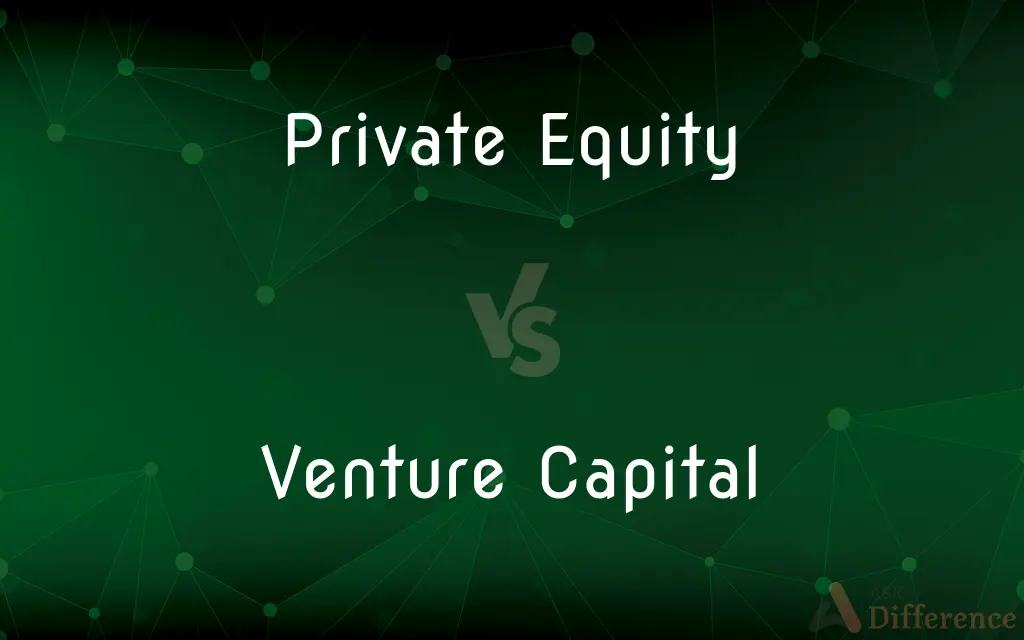Private Equity vs. Venture Capital — What's the Difference?
By Tayyaba Rehman — Published on November 14, 2023
Private Equity invests in mature companies, often through buyouts; Venture Capital funds startups and early-stage firms.

Difference Between Private Equity and Venture Capital
Table of Contents
ADVERTISEMENT
Key Differences
Private Equity and Venture Capital are both subsets of the broader private markets investment universe, but they target different company stages. Private Equity typically involves investing in established companies, often taking controlling stakes, aiming to optimize and later sell for a profit. On the other hand, Venture Capitalists fund startups or young companies with high growth potential, often without expecting immediate profits.
Private Equity's main focus is on optimizing the operations, management, and profitability of existing companies, often using leveraged buyouts to acquire these firms. Venture Capital, in contrast, seeks innovative businesses in their nascent stages, hoping that one or more of these firms will become significantly valuable in the future.
The risk profiles for Private Equity and Venture Capital differ significantly. Private Equity investments tend to be less risky since they target mature companies with proven business models. Venture Capital investments carry higher risks, as startups have uncertain futures, but they also offer higher potential returns.
The investment horizons for Private Equity and Venture Capital are distinct. Private Equity firms usually hold investments for 4-7 years, focusing on enhancing value before an eventual exit. Venture Capitalists might support companies for a longer duration, awaiting the firm to reach a stage where it can go public or be acquired.
Return expectations from Private Equity and Venture Capital differ due to their risk profiles. Private Equity expects steady, often double-digit returns, while Venture Capital aims for much higher returns, given the higher risk of startup investments.
ADVERTISEMENT
Comparison Chart
Target Companies
Established, mature firms
Startups or young, high-growth firms
Investment Focus
Optimization and profitability
Innovation and growth potential
Risk Profile
Lower (compared to VC)
Higher
Investment Horizon
4-7 years
Longer, until startup matures or has an exit opportunity
Return Expectations
Steady, often double-digit returns
Very high potential returns, acknowledging higher risks
Compare with Definitions
Private Equity
Acquires controlling stakes in firms.
The Private Equity firm bought a 60% stake in the company.
Venture Capital
Seeks high-growth potential businesses.
Venture Capitalists saw tremendous growth potential in the innovative product.
Private Equity
Aims for operational optimization and profitability.
Private Equity involvement led to streamlined operations and increased profits.
Venture Capital
Investment in startups and early-stage companies.
The tech startup secured its first round of Venture Capital funding.
Private Equity
Uses leveraged buyouts for acquisitions.
The company was acquired through a leveraged buyout by a leading Private Equity firm.
Venture Capital
Emphasizes innovation over immediate profitability.
While not yet profitable, its unique approach attracted Venture Capital interest.
Private Equity
Direct investment in private companies.
Many mature businesses seek Private Equity for operational optimization.
Venture Capital
Aims for high returns due to inherent risks.
Despite the risks, Venture Capitalists expect significant returns from successful startups.
Private Equity
Focuses on mature, established companies.
With a history of steady profits, the company attracted Private Equity interest.
Venture Capital
Funds in exchange for equity, often non-controlling.
The Venture Capital firm took a 20% stake in the startup.
Common Curiosities
What types of companies does Private Equity typically invest in?
Private Equity typically invests in mature, established companies.
How do Venture Capitalists choose startups to fund?
Venture Capitalists look for startups with innovative ideas and high growth potential.
Do all startups get Venture Capital funding?
No, only a fraction of startups secure Venture Capital funding; many factors like innovation, market potential, and team quality play a role.
How long do Private Equity firms usually hold their investments?
Private Equity firms typically hold investments for 4-7 years before seeking an exit.
How do Private Equity firms enhance the value of a company?
Private Equity firms optimize operations, streamline management, and improve profitability to enhance company value.
Can Private Equity firms take over the companies they invest in?
Yes, Private Equity often acquires controlling stakes, enabling them to make significant decisions.
How do Venture Capital returns compare to Private Equity?
Venture Capital aims for much higher returns due to the higher risks associated with startups.
Are Private Equity investments considered safer than Venture Capital?
Generally, Private Equity investments are seen as less risky since they target mature, proven companies, while Venture Capital targets riskier startups.
What is a typical exit strategy for Venture Capital?
Venture Capitalists typically aim for an exit when the startup goes public or is acquired by a larger entity.
Share Your Discovery

Previous Comparison
Tidal Wave vs. Tsunami
Next Comparison
Sunflower Oil vs. Palm OilAuthor Spotlight
Written by
Tayyaba RehmanTayyaba Rehman is a distinguished writer, currently serving as a primary contributor to askdifference.com. As a researcher in semantics and etymology, Tayyaba's passion for the complexity of languages and their distinctions has found a perfect home on the platform. Tayyaba delves into the intricacies of language, distinguishing between commonly confused words and phrases, thereby providing clarity for readers worldwide.














































